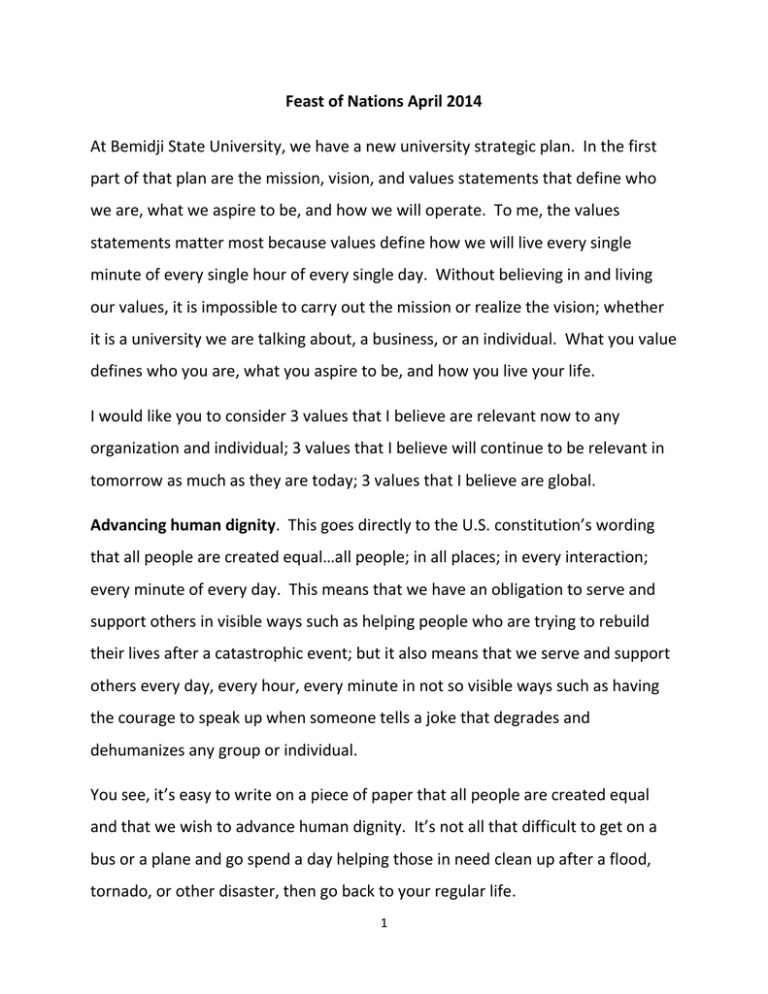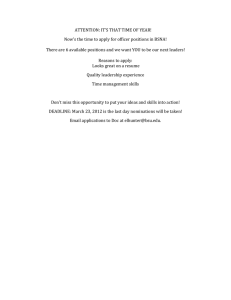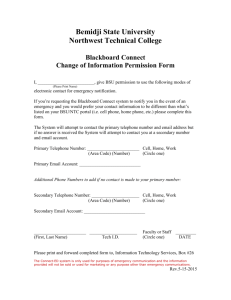Feast of Nations 2014
advertisement

Feast of Nations April 2014 At Bemidji State University, we have a new university strategic plan. In the first part of that plan are the mission, vision, and values statements that define who we are, what we aspire to be, and how we will operate. To me, the values statements matter most because values define how we will live every single minute of every single hour of every single day. Without believing in and living our values, it is impossible to carry out the mission or realize the vision; whether it is a university we are talking about, a business, or an individual. What you value defines who you are, what you aspire to be, and how you live your life. I would like you to consider 3 values that I believe are relevant now to any organization and individual; 3 values that I believe will continue to be relevant in tomorrow as much as they are today; 3 values that I believe are global. Advancing human dignity. This goes directly to the U.S. constitution’s wording that all people are created equal…all people; in all places; in every interaction; every minute of every day. This means that we have an obligation to serve and support others in visible ways such as helping people who are trying to rebuild their lives after a catastrophic event; but it also means that we serve and support others every day, every hour, every minute in not so visible ways such as having the courage to speak up when someone tells a joke that degrades and dehumanizes any group or individual. You see, it’s easy to write on a piece of paper that all people are created equal and that we wish to advance human dignity. It’s not all that difficult to get on a bus or a plane and go spend a day helping those in need clean up after a flood, tornado, or other disaster, then go back to your regular life. 1 I truly believe that what is much more difficult to do is to walk the talk of advancing human dignity every minute of every day in all places and at all times. Let’s look at one example. Rosa Parks refused to give up her seat to a white man on a bus in Montgomery, Alabama in 1955 when racial segregation was the norm in this country. Taking that action is what most people know and remember and cite as an early example of action that resulted in a turning point in the civil rights movement. However, many don’t know that there is much more to the story than a tired, black woman on her way home from work who didn’t want to stand up and move to the back of the bus in order for a white man to have a seat. Rosa Parks spent time at the Highlander School in Tennessee learning about social activism. She studied the history of those who came before her and those who took action to affect social change. She learned how to build networks of support and she learned how to establish relationships with key people who could support and sustain a movement. Then, while serving as secretary of the Montgomery NAACP, she had the quiet courage to stand up for others. She took action and made a stand. When she refused to give up her seat, it was a conscious, well planned, deliberate act that put her personal safety at risk. Later, she filed a lawsuit against the city of Montgomery, putting her life at risk, but did it to insure that one act of defiance on her part didn’t end with that act. Her decision was carefully and deliberately planned. She had support from a network of others who understood that sometimes it takes a movement to change what is unjust. You don’t have to be a Rosa Parks, but you, me, all of us need to walk the talk of advancing human dignity every minute of every day in everything we say, in 2 everything we write, and in everything we do. We are a University of and for the People. All people. We do not exclude, we include. Active Leadership…serving others to advance human dignity…Active leadership requires doing something, not just studying leadership principles and talking about how those principles might be implemented. And it doesn’t require a loud voice or fast talk. Rosa Parks was an introvert, but she was a leader. So were many others who worked quietly or still work quietly to change and influence, the world…Isaac Newton, Albert Einstein, Maria Montessori, Theodor Geisel, Charles Shultz, Steven Spielberg, Eleanor Roosevelt, J.K. Rowling, Bill Gates, Steve Wozniak, Warren Buffet, the Dalai Lama to name a few. Their efforts support what we know about active leadership, which was echoed by Margaret Mead: "Never doubt that a small group of thoughtful, committed, citizens can change the world. Indeed, it is the only thing that ever has." If we are to advance human dignity, we need active leadership. At BSU, this is why we provide multiple opportunities for students to engage in active leadership through organizations, clubs, and activities that have shared goals and that take collective action to make BSU and this community a better place. Leadership skills learned through engaging in those organizations, clubs, and activities become part of who we are, and lessons learned stay with us throughout our lives. 3 Finally, the value of collaboration. This is the value of ‘we do nothing alone.’ We are all connected, literally through the internet and figuratively as partners in determining the future of our planet. We have 12 partner universities in China, Malaysia, South Korea, Switzerland, Norway, and Germany where students can spend an affordable semester abroad. We have BSU students working and/or studying in China, Korea, England and Spain. We have faculty going to spend a month in China this June and others working with the Singapore Tourism Board to provide exhibit design programming for students there. We have student internships available in China and France with student teaching opportunities at a new International Academy in Weifang, China beginning in the fall. Every BSU student who wants to experience a semester abroad can afford to make that happen because of collaborations. In return, we are an affordable university for international students ; we have opportunities for students from those locations to come to BSU; and we expect to grow the number of international students at BSU to over 400 within the next 5 years. We live in a global, interconnected world, and as a public university we must collaborate and actively lead if we expect to advance human dignity…and more than that…as a nation we must collaborate and actively lead if we expect to survive as a species. Movements are the result of collaboration, and we know that collaboration can change a life, a community, a nation, and the world. 4 Those are three values that I believe are the foundation for what we are trying to build at Bemidji State University. I hope you see that those values are relevant to your life as well. On a final note, I want to leave a challenge: 1. Leave BSU a better place than you found it. Thank you for being a part of BSU and enriching our classrooms and community. 5

